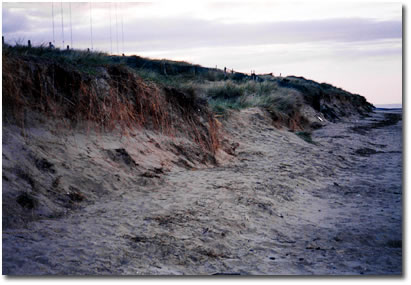|
|
|
|
|
|
 |
 |
|
|
| 9th
Infantry Division — World
War II — Normandy, France |
|
|
|
 |
 |
 |
 |
 |
 |
 |
|
Unlike
Omaha Beach, there wasn't
a steep bluff to negotiate
at Utah Beach in 1944. The
sand dunes at Utah Beach today
range in height from four
to eight feet along the Calvados
coast
|
STORY FROM
EIGHT STARS TO VICTORY CONTINUED:
"Utah Beach was practically flat,
but the enemy had extended his Atlantic
Wall to make up for this deficit of
nature. Parallelling the sea was a
wall of masonry, which ran for about
10,000 yards and was fortified by
a system of revolving tank turrets
set upon concrete bases. These fortifications
were known as Tobruk Pits. Barbed
wires, machine guns, uncountable numbers
of mines and other defensive measures
had been used by the Germans to halt
an invasion . . . and had failed.
"Behind the wall and running
almost parallel was the Beach Road
— dusty, hot and not too good
in spots. But it did connect with
Ste. Mere Eglise, Quineville, Montebourg,
Valognes and the rest of France.
"From Quineville south, and about
fifty yards from the beach began an
inundation caused by the Germans'
blocking of many small streams; this
marshland widened out to two miles
in some areas. Beyond the initially
barren coastline sprawled the famous
bocage (hedgerow) country of France,
a well-vegetated and rolling land,
which was admirably suited for defense.
Its streams, fields and hedgerows
were natural aids for the enemy.
"Because of the obstacles of
inundation, (Maj. Gen. J. Lawton Collins)
had to fight his VII Corps down a
narrow corridor. Two main roads led
over the Douve River and to the west
coast. One went through Ste. Colombe
and the other rolled through the road-center
town of St. Sauveur le Vicomte. After
obtaining elbow room for maneuvering,
the Corps would attempt to push west
and cut the peninsula and then finish
off the enemy to the north. Simultaneously,
its troops were to strive for capture
of Carentan and a linkup with the
V Corps to the south.
"It was June 10th and there was
a steady stream of wide-eyed soldiers
sloshing ashore. The newly-committed
90th Infantry Division was having
its first taste of combat and the
veteran Ninth had begun to unload
on schedule. Action was in the air.
"Whether it was the excitement
of the moment or desire to land as
soon as possible, only the ships'
masters could tell. At any rate the
many vessels which carried the Ninth
Infantry Division across the channel
had arrived twenty-four hours early,
and they sat at anchor during the
night of June 9-10. A welcome was
extended to the division by enemy
batteries, which shelled anything
they could.
"Orders were given to disembark
the first Ninth Division elements
on Saturday morning the 10th. It took
several days to unload the entire
division and required a great deal
of initiative, patience and skill
on the part of some commanding officers,
who borrowed landing craft to haul
their men beachward. By the 11th,
the 39th Infantry was almost completely
ashore; and although some of its transportation
and supporting weapons were missing,
the regiment was ready for combat.
That was exactly what awaited the
Falcons."
According to The History of the
47th Infantry Regiment, landing
operations on Utah Beach for the 47th
Infantry Regiment
began on June 11, 1944 — D-Day-plus-five.
"The men disembarked from the
assault craft about 150 yards from
shore and waded to land. Upon reaching
shore, each unit set out immediately
to march to the 9th Division transit
area in the vicinity of Sebeville,
Normandy," as written in The
History of the 47th Infantry Regiment.
Vincent Z. Whaley's grandfather, Pfc.
Starlin H. Hughes, F Company, 47th
Infantry Regiment, 9th Infantry Division,
died on June 11, 1994 — exactly
50 years to the day that he stepped
ashore Utah Beach in Normandy, France.
[ Back
to Photographs • Previous
Photograph • Next
Photograph ]
|
 |
 |
 |
|
|
 |
|
 |
|
|
|
|
|
|
|
|
|
 |
 |
|
